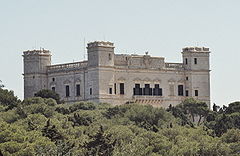Verdala Palace
| Verdala Palace | |
|---|---|
| Il-Palazz Verdala | |

View of Verdala Palace
|
|
|
Location within Malta
|
|
| Alternative names | Verdala Castle |
| General information | |
| Status | Intact |
| Type | Palace |
| Architectural style | Renaissance |
| Location | Buskett Gardens, Siġġiewi, Malta |
| Coordinates | 35°51′41.4″N 14°24′2.3″E / 35.861500°N 14.400639°E |
| Named for | Hugues Loubenx de Verdalle |
| Construction started | after 1581 |
| Completed | 1586 |
| Renovated | 17th century and 1720s |
| Owner | Government of Malta |
| Technical details | |
| Material | Limestone |
| Design and construction | |
| Architect | Girolamo Cassar |
| Website | |
| Official website | |
Verdala Palace is a palace in the Buskett Gardens, limits of Siġġiewi, Malta. It was built in 1586 during the reign of Hugues Loubenx de Verdalle, and it now serves as the official summer residence of the President of Malta.
The site of Verdala Palace was originally occupied by a hunting lodge, which was built in the 1550s or 1560s during the reign of Grand Master Jean Parisot de Valette. The lodge was built in the Boschetto, a large semi-landscaped area that was used by knights of the Order of Saint John for game hunting. The hunting lodge was expanded into a palace in 1586, during the reign of Hugues Loubenx de Verdalle. It was further embellished in the 17th and 18th centuries, during the reigns of Giovanni Paolo Lascaris and António Manoel de Vilhena.
During the French blockade of 1798–1800, the palace served as a military prison for French soldiers captured by the Maltese or British. During British rule, it became a silk factory, but it was eventually abandoned and fell into a state of disrepair. Some repairs were undertaken during the governorship of Frederick Cavendish Ponsonby, and it was fully restored by Governor Sir William Reid in the 1850s. Prior to its restoration it was a temporal minor hospital between 1915 and 1916. It subsequently became the official summer residency of the Governors of Malta. It was included on the Antiquities List of 1925. On the outbreak of World War II in 1939, works of art from the National Museum were stored at the palace for safekeeping. The palace was restored in 1982 and began to be used to host visiting heads of state.
...
Wikipedia

